Eylül Deniz Yaşar- Istanbul
The political stand-off on the Polish-Belarusian border has been ongoing for months now as thousands of asylum-seekers, mostly from Iraqi Kurdistan, Syria and elsewhere in the Middle East, have embarked on a life-threatening journey trying to reach Europe.
The information that Kalina Czwarnóg, a board member of Ocalenie Foundation, a non-profit organisation benefitting the public working on supporting refugees and immigrants in Poland, shared with Medya News in this interview shows that the ongoing stand-off on the border cannot be reduced to an issue of two countries or discussed solely on the basis of the antagonism between Poland and Belarus. Although there are other actors involved, the international mainstream media falls short of addressing the root of the crisis and the roles of these other actors.
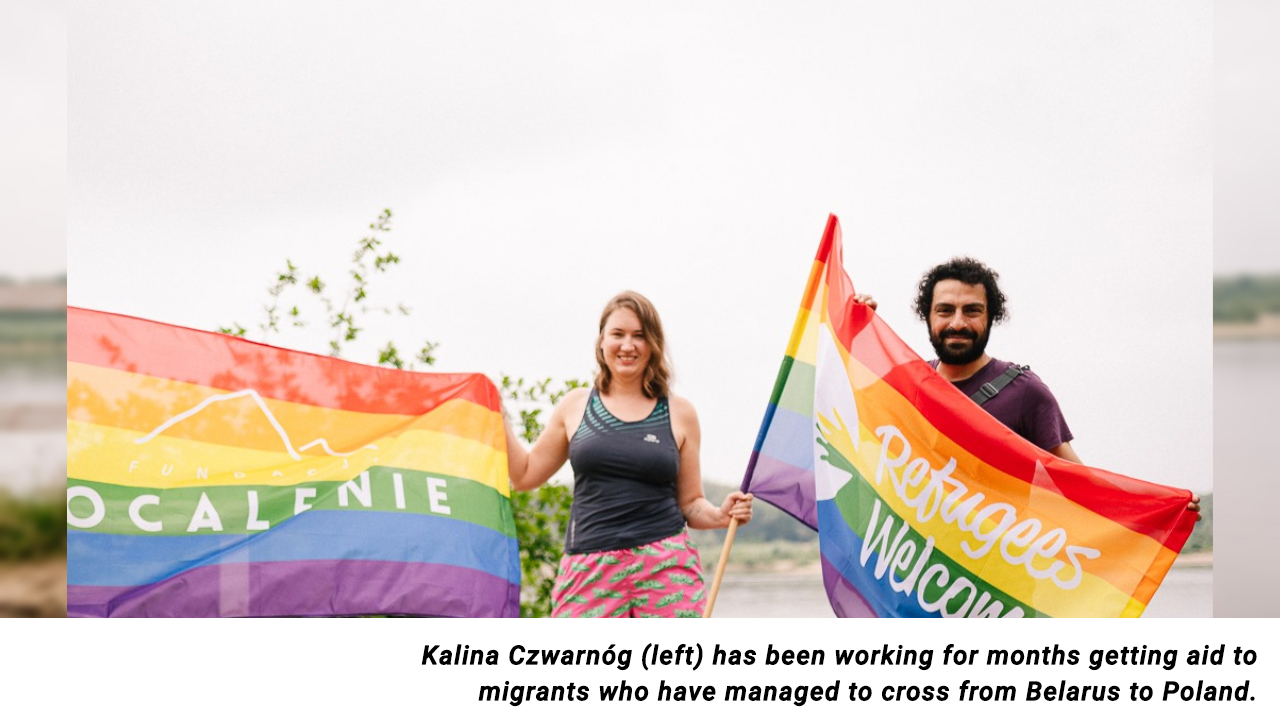 Kalina has been working actively on the Polish side of the border, combining efforts with many other volunteers to welcome the migrants, trying to get supplies through to them without being spotted by the border guards, in a dangerous terrain of woodland and swamps. As Kalina explained, she has been spending all her time on the border for months now, and she agreed to have this interview half an hour before setting off for the border yet again.
Kalina has been working actively on the Polish side of the border, combining efforts with many other volunteers to welcome the migrants, trying to get supplies through to them without being spotted by the border guards, in a dangerous terrain of woodland and swamps. As Kalina explained, she has been spending all her time on the border for months now, and she agreed to have this interview half an hour before setting off for the border yet again.
She draws a striking portrait of what she observes directly in the field: pregnant women giving birth straight after a traumatic journey through the Polish border; migrants arriving in Poland in shock due to hypothermia or with bleeding wounds from the barbed wire cutting their skin to pieces as they struggle through it; people who have not eaten so much as a piece of bread for days and nights on end… Kalina invites people to see the “bigger picture” behind the humanitarian catastrophe on the Belarusian-Polish border and to reach out to their governments for a solution.
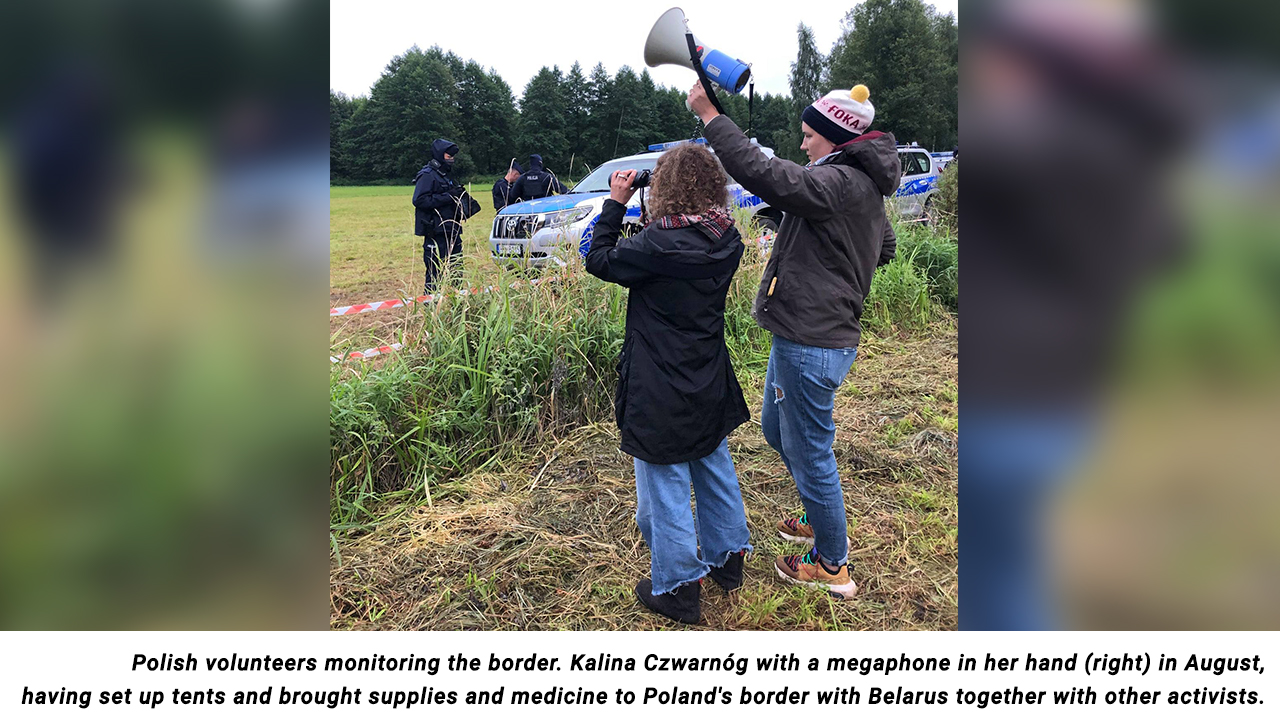 Dear Kalina, can you please first describe your work with the Ocalenie Foundation in Poland regarding the current humanitarian crisis on the border with Belarus?
Dear Kalina, can you please first describe your work with the Ocalenie Foundation in Poland regarding the current humanitarian crisis on the border with Belarus?
In normal circumstances, Ocalenie works on the integration of migrants into Poland, but right now, because of the humanitarian crisis on our borders, we have unfortunately had to start work on delivering humanitarian aid, because we are now helping people out who are staying outside day and night in the woods and swamps on the Polish-Belarusian border, constantly on the move because they are trying to enter the European Union from Belarus.
How does the ban on NGOs like your organisation work? Are you able to enter the restricted area on Poland’s side? Are you in contact with volunteers from Belarus?
At the beginning of September the Polish government declared a state of emergency in the three-kilometre wide border zone. So no one is really able to enter that region. No journalists, no human rights workers, only local people who live in the area can enter the area. Fortunately, there are some local people in this area who are also trying to help the migrants and refugees. So these are really the heroes of our times.
Unfortunately, there is almost no assistance from the Belarusian side because of the regime. People are really scared of the security forces, and they are very visible near the border.
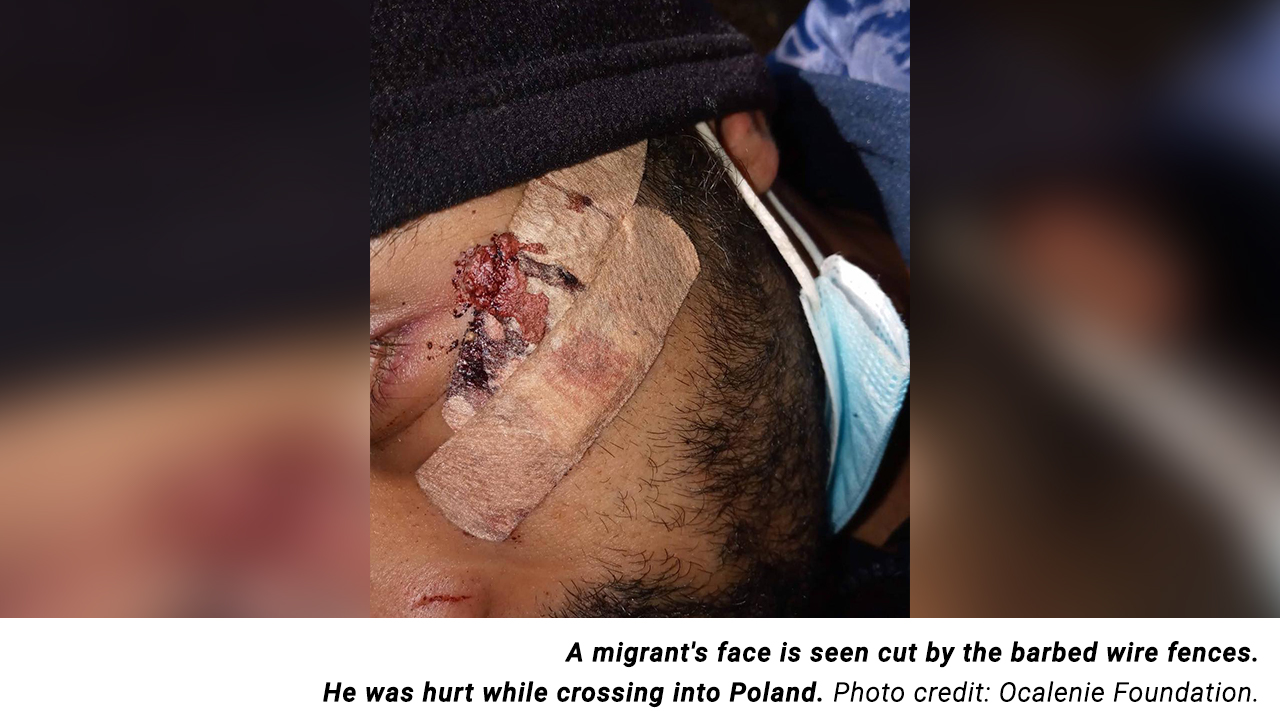
What human rights abuses are taking place at the border, have you yourself or your organisation so far experienced, documented or observed any police violence from either the Polish or Belarus police?
One thing we know so far is that the Belarusian police are more violent. We often hear about them beating people, giving people electric shocks, using dogs to scare them and to push them to cross the border. Most of the border is now divided by the fence, the barbed-wire fence. So when the Belarusians physically push people to cross the border, they are pushing them against the barbed wire, and they get hurt.
According to what we hear from the migrants, the Polish border guards are not as violent as the Belarusian police, but the Polish guards are pushing people back illegally. According to the law, if someone appears in Poland and asks for international protection, the border guards should take this person to their premises and let them make an application for it, but this is not happening. The border guards are just taking those people back to the border and physically pushing them back to the Belarusian side. This practice is completely illegal, and should never happen, especially in the EU.
Your foundation wrote a letter addressed to the EU Commissioner for Home Affairs, Ylva Johansson, prior to her meeting with Mariusz Kamiński, the Polish minister of the Interior and Administration, on the situation on the Polish-Belarusian border. When I read the letter, I observed that your foundation was very critical of the Polish government. Can we discuss more about the political background of this crisis in your country just now; how do you observe your government’s handling of the refugees?
Unfortunately, the ruling party, the Law and Justice Party, has experience of using the subject of refugees to scare people and to gain support from the voters. They did it before, in 2015-16, during the presidential and parliamentary elections, when they won and gained power. So now they are using this subject again. They employ a very racist narrative. They are using fear to gain more power. So this is very disturbing. Unfortunately, so far they have been successful; more than half of the people in Poland support them and don’t want to let these people into Poland, the people who are trying to enter Poland from Belarus.
So we think this is absolutely outrageous. This policy being used on our borders goes against basic humanitarian laws. Another thing that bothers me is that the European Union is saying we should protect EU borders, and the Polish-Belarusian border is also an EU border. Even though the EU doesn’t support the pushbacks, it supports keeping people outside our border.
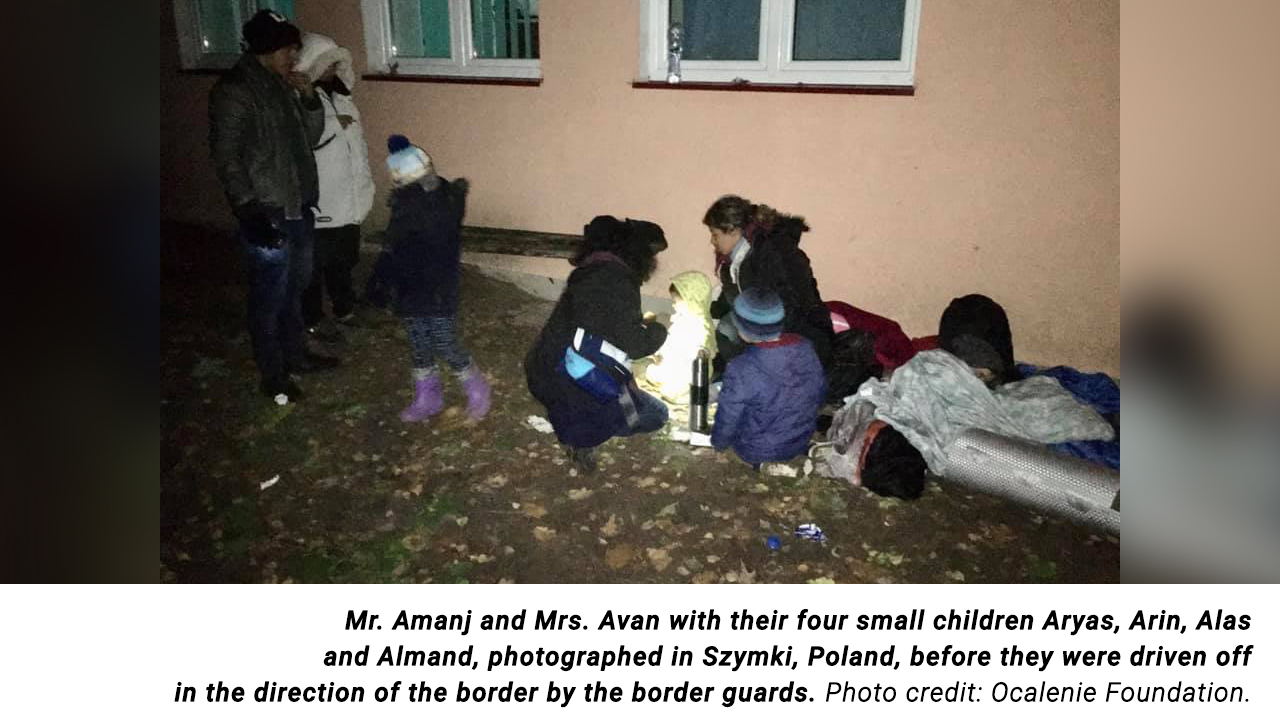 Can you share more about the demographics of the current refugee population on the border? How many people are we talking about? Which countries are the sources of this migrant flux? What are the origins of the migrants as far as you know?
Can you share more about the demographics of the current refugee population on the border? How many people are we talking about? Which countries are the sources of this migrant flux? What are the origins of the migrants as far as you know?
First of all, nobody knows how many people we are talking about. I think only Belarus know that, but I am not sure if they are going to share the true information, because they are using propaganda, because they are trying to put pressure on Poland and the EU. So, I think no one outside Belarus really knows what numbers are we talking about.
There are many Iraqi Kurdish migrants, but there are not only Iraqi Kurds. We meet people from Syria, from Yemen, from Lebanon, sometimes we meet people from Afghanistan and Iran. We also meet people from Africa, places like Congo and Cameroon.
Most of the people are young males. We meet quite a lot children, women, sometimes we even meet pregnant women. From time to time we see elderly people. We see people who have lived in refugee camps for many years. We also see people who are engineers, doctors, lawyers, journalists… So the demographics really vary a lot.
When you say “we meet people”, you are talking about those who are able to cross into Poland, right? How do you welcome them? It must be a traumatic process… What does the process entail, of you volunteers from Poland meeting with migrants who have just arrived in your lands?
Yes, of course. In most cases, they contact us on our mobile. They send us information about where exactly they are, and they tell us things like, “We need water, food, we haven’t eaten for the last three days, we need clothes that are not wet”, etc. Sometimes they say that somebody needs medical attention. So then we pack our backpacks, get in our cars and go where they say and try to find them somewhere in the woods or in the swamps.
We have to be careful not to be seen by the security forces, because we know that if they see us we might not be able to help the migrants. Sometimes people want to apply for international protection in Poland, then we try to assist them in that process.
Sometimes we have to call an ambulance, because people are, for example, in the second stage of hypothermia, or they are injured somehow. There have been women who have given birth after that terrible journey. Unfortunately, there have also been fatalities. At least 10 people have died on this border.
The European media, in general, discusses the crisis on the border as if it were an issue only between Belarus and Poland. They do not seem to reflect the bigger picture. There was the recent BILD report, which said that many migrants had been transported from Istanbul to Minsk by Turkish Airlines planes, and also by another airline owned by Russia, which is a close ally of Turkey, especially in their joint plans in northeast Syria. Considering all of this, what are your opinions regarding the roles of Turkey and Russia? How do you evaluate the idea of refugees being used as a tool for demonstrations of diplomatic power by governments worldwide?
Being Polish it is apparent to me that Lukashenko doesn’t work for himself; he is just a tool in the hands of Putin. But it is a very valid point that you make about Erdoğan and Turkey in general, because I think that for him, this is just another way of trying to exert some influence over the EU – he did the same thing with refugees coming to Greece just few years ago. The same thing is happening again now, but by air.
I think this point is very valid, I haven’t read the material from BILD yet. But I think we need to see this bigger picture. Because these are things that are closely connected right now. And I think that dealing only with Belarus would not fix the problem, because the problem goes back to Moscow, it goes back to Ankara.
I think we should all speak out, reach out to our governments and show that we do not accept this inhumane policy. I think in the 21st century, we already know that no wall can stop migration, that people cannot be used as tools of war, of politics. This has to be stopped, we can’t go on like this.
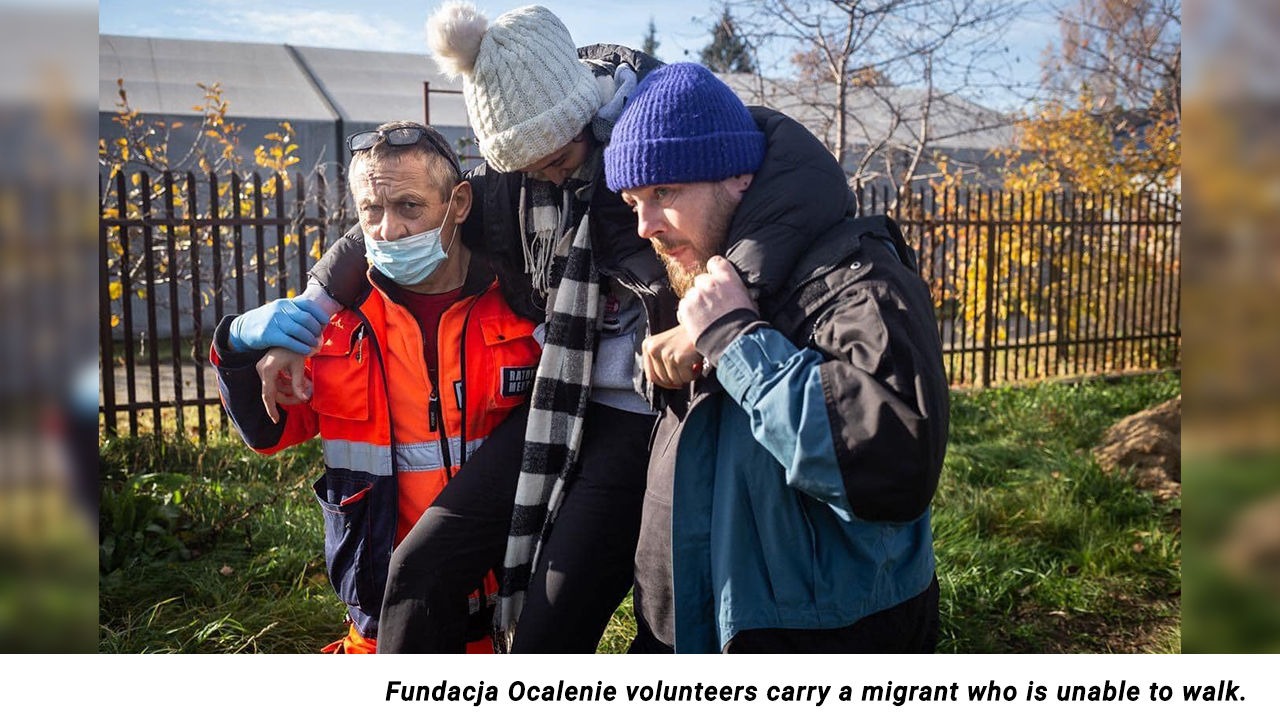 Heated debates blurring the reality of war
Heated debates blurring the reality of war
Poland says the government of Alexander Lukashenko has lured thousands to Belarus to force their way into European Union countries in revenge for sanctions, whilst Belarus blames Warsaw for deliberately escalating tensions. Russian Foreign Minister Sergei Lavrov last week said that countries from which refugees enter the EU “should be treated the same”. This is a reference to a 2016 deal whereby the EU provided funds to Turkey, which was also accused of weaponising migration against Europe when thousands of refugees in Turkey set off for the borders with Greece and Bulgaria in February 2020, after the Turkish government announced it had opened the passage for migrants wishing to cross.
Turkey’s name also came up when a list of airline companies facilitating the movement of people to Belarus was revealed that included Turkish Airlines, which some Polish officials accused of having increased the frequency of Minsk-bound flights in recent weeks.
Poland’s accusations against Turkey of acting in “full synchronisation” with Russia and Belarus were followed by a move by the President of the European Commission, Ursula von der Leyen, who on 8 November said that EU will widen its sanctions, including through “blacklisting third country airlines that are active in human trafficking”, interpreted to be referring to Turkish Airlines and Russia’s Aeroflot.
Meanwhile the Belarusian embassy in Bahgdad and its consulate in Erbil were quietly closed down. Erbil (Hewlêr in Kurdish) is the capital of Iraqi Kurdistan, which has been one of the least visible actors in this crisis despite the fact that there are currently approximately 2,500 Iraqi Kurds including over 200 children in Belarus, according to Ako Mejid, a Kurdish journalist who is closely following the situation and is currently with those migrants on the Belarusian side of the border.
According to the migrants who talked to Ako, there is a socio-economic and political background to this massive wave of migration from Iraqi Kurdistan that includes unemployment, and lack of faith in the policies of the Iraqi Kurdistan government, ruled by the Kurdistan Democratic Party (KDP), which has close relation with Turkey and the Turkish president Recep Tayyip Erdoğan.
The KDP has been frequently criticised for its tribalist, male-dominant, conservatist political line, and for its close ties with the Turkish government, which is known to have been trying to evacuate Kurdish-populated regions in Iraqi Kurdistan as it is doing in Syria, and as it has been doing in the southeastern region of Turkey itself since the 1990s, by the use of scorched-earth policies.
All these issues raised by the Iraqi Kurdish migrants show that this is not a “refugee/migrant crisis” as the mainstream international media calls it. This terminology hides the real actors, because when they call it a migrant crisis, they associate the root of the crisis with the migrants, but in fact migration is ultimately the result of a global crisis, that could perhaps be called a “crisis of civilisation”, resulting in the forced displacement of peoples, who are sick and tired of living in fear and poverty in their homelands.
In the light of all these developments, such a degree of criticism of a few of the ‘visible’ actors, and the inability to criticise others, including our own governments, does not help much in addressing the actors behind the scenes. And these same developments conceal the reality of the war taking place in the Kurdish lands and in the neighbouring countries in the Middle East, which is the actual cause of the crisis at hand.








![25 years in solitary confinement: Global campaign for Öcalan’s freedom, justice for Kurdish rights gains momentum [LIVE BLOG]](https://medyanews.net/wp-content/uploads/2024/02/UPDATE-1-1-120x86.jpg)
